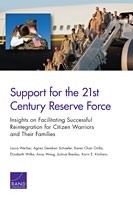| 来源类型 | Research Reports
|
| 规范类型 | 报告
|
| ISBN | 9780833081384
|
| 来源ID | RR-206-OSD
|
| Support for the 21st-Century Reserve Force: Insights to Facilitate Successful Reintegration for Citizen Warriors and Their Families |
| Laura Werber; Agnes Gereben Schaefer; Karen Chan Osilla; Elizabeth Wilke; Anny Wong; Joshua Breslau; Karin E. Kitchens
|
| 发表日期 | 2013
|
| 出版年 | 2013
|
| 页码 | 248
|
| 语种 | 英语
|
| 结论 |
Several Factors Are Related to Reserve Component Families' Reintegration Success- Factors associated with successful reintegration included the family feeling ready for deployment; the service member deploying with his or her own unit; adequate communication from the unit or Service during and after deployment; the service member returning without a psychological issue, physical wound, or injury; and comfortable family finances.
- Successful reintegration from the families' perspective is related to military career preferences. The reintegration experience can influence a service member's guard or reserve career plans and his or her spouse's or partner's preferences for continued service.
A Complex "Web of Support" Is Available to Reserve Component Families to Assist Them with Reintegration- Resource providers that support reserve component families fall into five broad categories: government organizations (U.S. Department of Defense and other federal programs, as well as state and local government agencies), private for-profit organizations, private nonprofit organizations, faith-based organizations, and informal resources (including family, friends, and social networks).
- This web of support is extensive but can be difficult for families and resource providers to navigate. Both groups identified barriers to the effective use of reintegration support resources. Those cited by providers included difficulty reaching some populations and a lack of coordination across providers. Families discussed concerns related to access and resource quality.
- Reserve component personnel and their families often rely on unit-based resources. Informal support resources also play a critical role, particularly for families that live far from a military installation.
|
| 摘要 |
- To facilitate reintegration success for reserve component families, the U.S. Department of Defense (DoD) should emphasize early preparation for reintegration by encouraging families to prepare for reintegration before and during deployment and reaching out to them sooner after deployment.
- DoD should also involve family members in the reintegration process, particularly by engaging spouses more and facilitating good family communication throughout the deployment cycle.
- DoD should shape perceptions about reintegration by removing the stigma associated with self-care and recognizing successful reintegration.
- DoD should refine the Yellow Ribbon Reintegration Program so that it better meets these families' needs. This could include making it easier for families to participate and customize their experience, learning from events' successes and failures, and instituting standard criteria for provider participation.
- DoD should ensure that units have the resources they need to communicate adequately with families and otherwise provide support.
- DoD should also improve the ways it learns about families' reintegration experiences and encourage families to learn from each other by promoting best practices for successful reintegration.
- DoD should expand its efforts to leverage the support resources offered by nongovernmental programs, promote community awareness of the challenges reserve component families face, and honor employers that support guard and reserve employees.
- DoD should also identify gaps and overlaps in the support resources available to reserve component families. It should work to improve coordination among providers and address the reasons for a lack of resource use among these families (e.g., difficulty accessing resources, lack of awareness of resources, concerns about quality, inadequate outreach, cost, and difficulty obtaining information).
- To improve the overall strength and coverage of the web of support for reserve component families, DoD should encourage providers to develop and learn from measures of effectiveness intended to evaluate how well they are meeting the needs of this population.
|
| 主题 | Military Demobilization
; Military Families
; Military Health and Health Care
; Military Reserves
|
| URL | https://www.rand.org/pubs/research_reports/RR206.html
|
| 来源智库 | RAND Corporation (United States)
|
| 资源类型 | 智库出版物
|
| 条目标识符 | http://119.78.100.153/handle/2XGU8XDN/107576
|
推荐引用方式
GB/T 7714 |
Laura Werber,Agnes Gereben Schaefer,Karen Chan Osilla,et al. Support for the 21st-Century Reserve Force: Insights to Facilitate Successful Reintegration for Citizen Warriors and Their Families. 2013.
|
|
文件名:
|
x1495315147067.jpg
|
|
格式:
|
JPEG
|

|
文件名:
|
RAND_RR206.pdf
|
|
格式:
|
Adobe PDF
|
除非特别说明,本系统中所有内容都受版权保护,并保留所有权利。